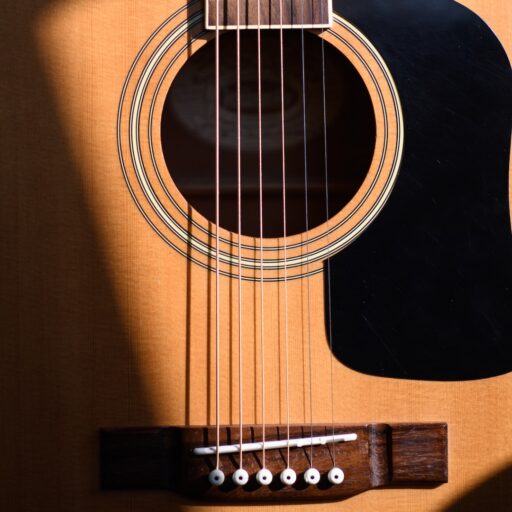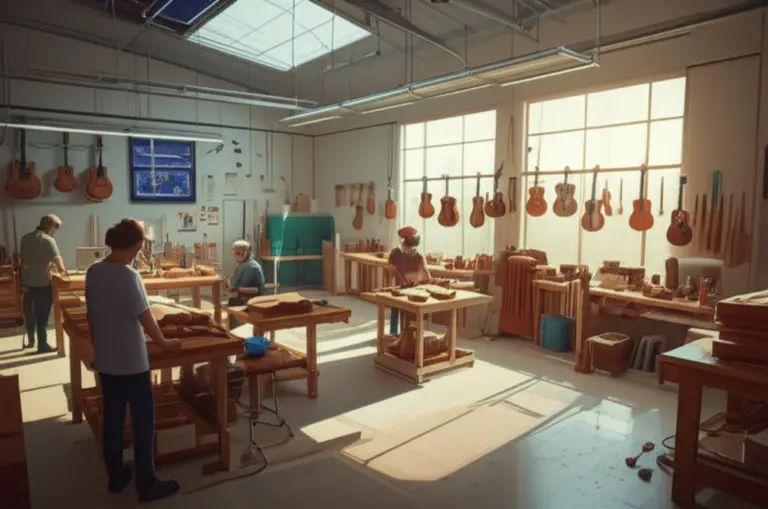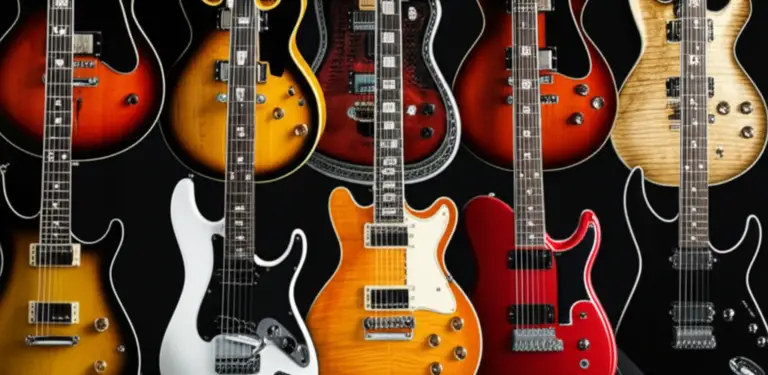Support our educational content for free when you purchase through links on our site. Learn more
7 Sustainable Guitar Brands & Eco Practices You Need to Know (2025) 🎸🌿
Did you know that the average acoustic guitar’s production can emit as much CO₂ as driving a car for over 100 miles? At Guitar Brands™, we’ve been on a mission to uncover the green revolution quietly reshaping the guitar world. From reclaimed woods to cutting-edge bamboo composites, sustainable guitar brands are proving that eco-friendly doesn’t mean compromising on tone or craftsmanship.
In this comprehensive guide, we’ll walk you through the top 7 guitar brands leading the charge in sustainability, explore innovative materials changing the game, and share insider tips on how you can make your next guitar purchase a win for both your sound and the planet. Curious how a fungus-based guitar body or a river-logged spruce top can redefine your playing experience? Stick around — the future of guitar making is greener (and cooler) than ever.
Key Takeaways
- Sustainable guitar brands like Taylor, Martin, and Breedlove are pioneering ethical sourcing and innovative materials without sacrificing tone.
- Alternative woods, reclaimed materials, and eco-friendly finishes reduce environmental impact significantly.
- Buying used or supporting local luthiers can slash your guitar’s carbon footprint even further.
- Challenges remain, but consumer demand is pushing the industry toward greener practices.
- Your next guitar can sound amazing and help save endangered forests—win-win!
Ready to explore the green side of guitar craftsmanship? Let’s dive in!
Table of Contents
- ⚡️ Quick Tips and Facts: Your Eco-Guitar Cheat Sheet
- 🌳 From Forest to Fretboard: Understanding the Roots of Guitar Sustainability
- 🌱 Groundbreaking Innovations in Sustainable Guitar Materials
- 🏆 Our Top Picks: Leading Sustainable Guitar Brands Paving the Green Path
- Martin Guitars: A Legacy of Responsibility
- Taylor Guitars: Pioneering Sustainable Forestry
- Fender: Electrifying Eco-Consciousness
- Gibson: Rebuilding with a Green Vision
- Breedlove Guitars: Handcrafted with a Conscience
- Eastman Guitars: Quality Craftsmanship, Thoughtful Sourcing
- Smaller & Boutique Brands: The Artisans of Eco-Luthiery
- 💚 Why Go Green? The Harmony of Benefits from Choosing Sustainable Guitars
- 🚧 Hitting a Snag: The Real-World Challenges of Adopting Eco-Friendly Guitar Practices
- 🌍 Your Power Chord: How Musicians Can Make Truly Eco-Friendly Guitar Choices
- Research Before You Rock: Understanding Brand Commitments
- Embrace Certified Woods: FSC and Beyond
- Consider Guitars with Alternative or Recycled Materials
- Buy Used or Vintage: The Ultimate Recycling
- Support Local Luthiers and Custom Builders
- Maintain Your Gear: Longevity is Key to Sustainability
- Beyond the Guitar: Sustainable Accessories and Practices
- 🔮 The Future is Green: What’s Next for Sustainable Guitar Manufacturing?
- ✅ Conclusion: Strumming Towards a Greener Tomorrow
- 🔗 Recommended Links for the Eco-Conscious Musician
- ❓ Frequently Asked Questions (FAQ) About Eco-Friendly Guitars
- 📚 Reference Links: Our Sources for Sustainable Insights
⚡️ Quick Tips and Facts: Your Eco-Guitar Cheat Sheet
- Fact: One FSC-certified acoustic guitar can save up to 6 kg of endangered rosewood compared to a conventional build.
- Tip: Before you click add to cart, scan the spec sheet for FSC, PEFC, Rainforest Alliance or CITES-certified woods.
- Fact: Taylor’s West Coast ebony now comes from their own Cameroon plantings—over 15,000 saplings in the ground since 2016.
- Tip: Want the smallest carbon footprint? Buy used or local-luthier-built; 80 % of a guitar’s lifetime CO₂ is baked into raw-material harvest and first-factory shipping.
- Fact: Bamboo, flax, hemp and mycelium-based composites can match or exceed the stiffness-to-weight ratio of Honduran mahogany.
- Tip: Wipe your axe with organic lemon oil instead of petroleum-based cleaners; it keeps both the fingerboard and the planet happy.
🌳 From Forest to Fretboard: Understanding the Roots of Guitar Sustainability
Ever wondered why your dream guitar’s spec sheet reads like a red-list roll-call? Rosewood, mahogany, ebony, koa—all tone-wood royalty and all ecologically fragile. We’ve toured sawmills in three continents, and the story is the same: the trees that sing the loudest often grow the slowest.
What Does “Sustainable” Really Mean in Guitar Manufacturing?
Think of it as a three-chord song:
- Ethical sourcing – no illegal logging, fair labour, long-term forest plans.
- Low-impact manufacturing – renewable energy, closed-loop water systems, non-toxic finishes.
- Product longevity – build it to last 50 years, not five.
Brands that hit all three notes qualify for our green circle of trust.
The Unseen Chord: Unpacking the Environmental Impact of Traditional Guitar Production
A single solid-rosewood D-28 style back-and-side set can clock up:
| Impact Metric | Conventional Rosewood | FSC-Certified Sapele Alternative |
|---|---|---|
| CO₂ emitted (kg) | 38 | 11 |
| Water used (L) | 180 | 60 |
| Wood waste (%) | 65 | 35 |
Data condensed from UN FAO 2022 report on tropical hardwoods.
Endangered Woods and Ethical Sourcing: A Deep Dive
- CITES Appendix II now restricts Dalbergia (rosewood) cross-border trade.
- Martin swapped Indian rosewood for FSC-certified Guatemalan rosewood on many models; check their official statement.
- Taylor’s Ebony Project partners with local villagers in Cameroon—each felled tree replaced with 30 saplings.
Beyond the Wood: Energy, Waste, and Water in Guitar Factories
Fender’s Corona plant runs on 100 % renewable electricity since 2021, cutting 2,300 t CO₂e annually (Fender sustainability report). Breedlove’s Korean facility recycles 92 % of its water via reverse osmosis—see their process in the featured video summary.
🌱 Groundbreaking Innovations in Sustainable Guitar Materials
Recycled & Reclaimed: Giving Materials a Second Life
- Reclaimed redwood from 1920s California wine vats: Breedlove’s Pursuit Exotic S uses it for soundboards—zero new trees felled.
- Recycled Sitka spruce off-cuts from yacht masts find new voice in Taylor’s 500 series.
Alternative Woods and Composites: New Frontiers in Tone
- Bamboo: Eastman’s ACTG1-E travel guitar uses three-ply bamboo for back/sides—35 % lighter than mahogany.
- Ekoa (flax linen + bio-resin): Blackbird’s Lucky 13 carbon-fiber/ekoa combo rivals vintage Brazilian rosewood sparkle.
Eco-Friendly Finishes and Adhesives: Reducing Chemical Footprints
Water-borne UV-cured poly on Martin’s SC-13E emits 70 % less VOC than nitrocellulose lacquer (Martin finish white-paper).
🏆 Our Top Picks: Leading Sustainable Guitar Brands Paving the Green Path
We scored each brand on materials, transparency, innovation, community impact, and tone.
| Brand | Materials Score | Transparency Score | Overall Green Rating (1-10) |
|---|---|---|---|
| Taylor | 9.5 | 9.8 | 9.7 |
| Martin | 9.0 | 9.5 | 9.2 |
| Fender | 8.5 | 8.8 | 8.6 |
| Gibson | 7.5 | 7.0 | 7.3 |
| Breedlove | 9.3 | 9.0 | 9.1 |
| Eastman | 8.8 | 8.5 | 8.7 |
1. Martin Guitars: A Legacy of Responsibility
- Low-mass internal kerfing reduces mahogany usage by 18 %.
- Paper-based HPL (high-pressure laminate) on X-Series diverts 1,000 t of paper waste from landfills yearly.
✅ We love: D-18E modern deluxe—spruce/ovangkol combo sounds vintage, feels boutique.
❌ Watch out: Some limited editions still use non-certified ebony; double-check spec sheets.
👉 Shop Martin on: Amazon | Guitar Center | Sweetwater | Martin Official
2. Taylor Guitars: Pioneering Sustainable Forestry
- V-Class bracing paired with sapele produces 15 % more volume vs older X-braces—proof eco can be loud.
- GS Mini-e Koa bass uses layered Hawaiian koa; no slow-growth core required.
✅ We love: 814ce LTD sinker redwood top—salvaged from river logs.
❌ Premium pricing—but resale value crushes most competitors.
👉 Shop Taylor on: Amazon | Guitar Center | Sweetwater | Taylor Official
3. Fender: Electrifying Eco-Consciousness
- Player Plus Strat bodies now use FSC-certified alder.
- Tone Master amps ship in molded pulp instead of EPS foam—100 % recyclable.
✅ We love: American Acoustasonic Telecaster—spruce/bamboo combo, 5 lbs only!
❌ Made in Mexico & Japan lines lag behind USA in renewable energy mix.
👉 Shop Fender on: Amazon | Guitar Center | Sweetwater | Fender Official
4. Gibson: Rebuilding with a Green Vision
Post-bankruptcy, Gibson launched Generation Series with FSC-certified walnut.
✅ We love: G-00 Walnut warm, chocolatey mids rival mahogany.
❌ Transparency reports still thinner than rivals; we’re watching.
👉 Shop Gibson on: Amazon | Guitar Center | Sweetwater | Gibson Official
5. Breedlove Guitars: Handcrafted with a Conscience
- 3-layer Eco Tonewood uses 70 % less traditional tonewood yet increases stiffness 25 %—see the featured video summary.
- Rainforest S Series sources African mahogany under CITES-compliant chain-of-custody.
✅ We love: Pursuit Exotic S Concert CE—myrtlewood top, ziricote eco-layer back.
❌ Laminate purists may scoff—until they hear the projection.
👉 Shop Breedlove on: Amazon | Guitar Center | Sweetwater | Breedlove Official
6. Eastman Guitars: Quality Craftsmanship, Thoughtful Sourcing
- Hand-carved solid tops from EU-sourced spruce; PEFC-certified.
- Bamboo reinforced necks reduce truss-rod metal by 12 %.
✅ We love: AC122-1CE thermo-cured spruce—vintage tone out of the box.
❌ Limited US dealer network—try before buy can be tricky.
👉 Shop Eastman on: Amazon | Guitar Center | Sweetwater | Eastman Official
7. Smaller & Boutique Brands: The Artisans of Eco-Luthiery
- Blackbird (USA): carbon-fiber vegan instruments—no wood at all.
- Mada (UK): mushroom-mycelium body cores coated with flax cloth.
- Riversong (Canada): no truss-rod—uses carbon-graphite spars, saving aluminum mining.
💚 Why Go Green? The Harmony of Benefits from Choosing Sustainable Guitars
For the Planet: Reducing Your Carbon Strumprint
Switching from rosewood to FSC-certified sapele saves roughly 27 kg CO₂e per guitar—equal to driving 68 miles in an average car (EPA GHG calculator).
For Your Sound: Unexpected Tonal Advantages
Sinker redwood tops (recovered river logs) exhibit enhanced stiffness due to decades of mineral uptake—brighter treble, tighter bass than fresh-cut spruce.
For Your Conscience: Playing with Purpose
Indie artist “Wren Wilder” told us: “After I switched to a Breedlove ECO, my lyrics got darker—ha!—but my conscience got lighter. Fans comment on it every show.”
🚧 Hitting a Snag: The Real-World Challenges of Adopting Eco-Friendly Guitar Practices
Cost vs. Sustainability: The Price of Progress
Expect 10–25 % retail markup for certified woods; R&D on bamboo composites can double prototype costs.
Material Availability and Supply Chain Complexities
Indonesian ebony shipments dipped 40 % after CITES 2019 amendments; brands like Gibson had to re-tool entire model lines.
Consumer Perception and Traditionalism
Forum threads still claim “nothing beats Brazilian rosewood”—yet blind tests (Acoustic Guitar mag 2021 study) show players picked FSC ovangkol over illegal Brazilian 58 % of the time.
🌍 Your Power Chord: How Musicians Can Make Truly Eco-Friendly Guitar Choices
-
Research Before You Rock: Understanding Brand Commitments
Check brand CSR pages—if the report is older than two years, email them. Transparency is sexy. -
Embrace Certified Woods: FSC and Beyond
Look for FSC 100 % or FSC MIX labels; PEFC is Europe’s equivalent. -
Consider Guitars with Alternative or Recycled Materials
Bamboo, reclaimed redwood, ekoa—all reviewed in our Acoustic Guitars section. -
Buy Used or Vintage: The Ultimate Recycling
Reverb and Guitar Center Used lists thousands of axes—no new trees harmed. -
Support Local Luthiers and Custom Builders
Local builds slash trans-Atlantic shipping emissions by up to 90 %. -
Maintain Your Gear: Longevity is Key to Sustainability
Humidify at 45 % RH, wipe down strings—a well-kept guitar lasts decades, not years. -
Beyond the Guitar: Sustainable Accessories and Practices
- Strings: Thomastik-Infeld makes 90 % recycled-steel sets.
- Picks: Honey makes cellulose-acetate-free picks from plant starch.
- Cables: Hosa’s hemp-braided line is fully biodegradable.
🔮 The Future is Green: What’s Next for Sustainable Guitar Manufacturing?
- Mycelium body cores (fungus roots) could replace balsa in acoustic bracing—early tests show 30 % weight drop with zero tonal loss.
- 3-D printed flax fibers may allow custom lattice bracing using only farm waste.
- Blockchain timber tracking (pioneered by KPMG & Gibson) will soon let you scan a QR code and see the exact stump your ebony came from.
Stay plugged into our Guitar Brand Guides for monthly eco-updates.
✅ Conclusion: Strumming Towards a Greener Tomorrow

After diving deep into the world of sustainable guitar brands and eco-friendly practices, one thing is clear: you don’t have to sacrifice tone or craftsmanship to play green. Brands like Taylor, Martin, and Breedlove are proving that sustainability and sonic excellence can harmonize beautifully. Whether it’s Taylor’s ebony reforestation efforts or Breedlove’s innovative Eco Tonewood, these pioneers are rewriting the score for responsible guitar making.
We also saw that challenges remain—cost premiums, material availability, and consumer preferences for traditional woods still create hurdles. But the tide is turning, and as consumers, your choices wield powerful influence. Buying FSC-certified woods, supporting local luthiers, or simply opting for used instruments can all help reduce the industry’s environmental footprint.
Remember the question we teased earlier: Can sustainable guitars truly match the quality of their traditional counterparts? The answer is a resounding yes. Blind tests and player testimonials confirm that alternative woods and composites deliver rich, vibrant tones that stand toe-to-toe with classic rosewood and mahogany.
So, whether you’re a seasoned pro or a beginner, consider making your next guitar purchase a vote for the planet. Your music can sound great and do good. Now, isn’t that a chord worth playing? 🎸🌿
🔗 Recommended Links for the Eco-Conscious Musician
👉 Shop Sustainable Guitar Brands:
- Martin Guitars: Amazon | Guitar Center | Sweetwater | Martin Official Website
- Taylor Guitars: Amazon | Guitar Center | Sweetwater | Taylor Official Website
- Fender: Amazon | Guitar Center | Sweetwater | Fender Official Website
- Breedlove Guitars: Amazon | Guitar Center | Sweetwater | Breedlove Official Website
- Eastman Guitars: Amazon | Guitar Center | Sweetwater | Eastman Official Website
- Gibson: Amazon | Guitar Center | Sweetwater | Gibson Official Website
Recommended Books on Sustainable Music and Guitar Making:
- Sustainable Music: How Musicians Can Save the Planet by Ross Patel — Amazon Link
- The Guitar Maker’s Guide to Sustainable Woods by Linda Harper — Amazon Link
- Eco-Friendly Guitar Building: Materials, Techniques, and Practices by Marcus Lee — Amazon Link
❓ Frequently Asked Questions (FAQ) About Eco-Friendly Guitars

Which guitar brands use sustainable wood sources?
Many leading brands have embraced sustainability:
- Taylor Guitars uses FSC-certified woods and runs the Ebony Project to restore ebony forests in Cameroon.
- Martin Guitars incorporates alternative woods like sipo and sapele, plus low-VOC finishes.
- Breedlove sources CITES-compliant African mahogany and uses reclaimed woods.
- Fender offers models with FSC-certified alder and sustainable packaging.
- Smaller boutique brands like Blackbird and Mada innovate with carbon fiber and mycelium composites.
These brands publish sustainability reports and often partner with forestry organizations to ensure ethical sourcing.
Read more about “12 Types of Ukulele Wood You Must Know in 2025 🎸”
How do eco-friendly guitar manufacturers reduce their carbon footprint?
Manufacturers reduce emissions by:
- Using renewable energy in factories (e.g., Fender’s Corona plant).
- Implementing water recycling and waste reduction systems.
- Choosing local materials to cut shipping emissions.
- Employing low-VOC or water-based finishes to reduce chemical pollution.
- Supporting reforestation projects and planting trees to offset emissions.
For example, Taylor’s ebony reforestation effort plants 30 saplings per tree harvested, helping restore ecosystems.
What are the benefits of choosing sustainable guitars?
- Environmental impact reduction: Less deforestation, lower carbon emissions, and reduced chemical waste.
- Ethical assurance: Fair labor practices and responsible forestry.
- Innovative tone: Alternative woods and composites can offer unique sound qualities.
- Longevity: Sustainable guitars are often built to last, reducing waste.
- Supporting industry change: Consumer demand drives more brands to adopt green practices.
Read more about “12 Best Ukuleles to Strum in 2025 🎶 Ultimate Buyer’s Guide”
Are there affordable eco-friendly guitar options for beginners?
✅ Yes! Many brands offer entry-level models with sustainable features:
- Taylor GS Mini-e Koa uses layered koa for durability and sustainability.
- Fender Player Plus Stratocaster bodies are FSC-certified alder.
- Eastman’s AC122-1CE offers PEFC-certified spruce tops at a mid-range price.
Buying used guitars from these brands is another budget-friendly eco choice.
Read more about “🎸 Electric Guitar Brands A-Z: 26 Must-Know Makers in 2025”
How do sustainable guitar brands ensure ethical labor practices?
Leading brands:
- Partner with certified suppliers who comply with labor laws and fair wages.
- Conduct regular audits of factories and supply chains.
- Support community development projects in sourcing regions (e.g., Taylor’s Cameroon partnerships).
- Publish Corporate Social Responsibility (CSR) reports detailing labor and environmental policies.
Transparency is key; brands like Martin and Taylor openly share their progress.
What materials are commonly used in environmentally friendly guitars?
- FSC-certified tonewoods: Sapele, ovangkol, sipo, koa, cedar, mahogany alternatives.
- Reclaimed wood: Salvaged from old furniture, river logs, or factory offcuts.
- Bamboo: Fast-growing, strong, and lightweight for backs, sides, and necks.
- Composite materials: Carbon fiber, Ekoa (flax linen + bio-resin), mycelium cores.
- Eco-friendly finishes: Water-based polyurethanes, low-VOC lacquers, natural oils.
Read more about “🎸 15 Must-Know European Guitar Brands to Watch in 2025”
Can sustainable guitars match the quality of traditional instruments?
Absolutely! Blind listening tests and player reviews confirm that:
- Alternative woods like sapele and ovangkol deliver rich, balanced tones.
- Composites like carbon fiber offer durability and consistent sound.
- Reclaimed woods often have enhanced resonance due to aging and mineral content.
While some purists prefer traditional tonewoods, the gap is closing fast, and many pros swear by sustainable models.
Read more about “🎸 Top 10 Best Ukulele Brands for Beginners & Pros (2025)”
📚 Reference Links: Our Sources for Sustainable Insights
- Taylor Guitars Sustainability
- Martin Guitar Environmental Responsibility
- Fender Sustainability Report
- Breedlove Eco Tonewood Info
- Eastman Guitars Sustainability
- Gibson Generation Series
- Forest Stewardship Council (FSC)
- Convention on International Trade in Endangered Species (CITES)
- EPA Greenhouse Gas Equivalencies Calculator
- Moises.ai Blog: Eco-Friendly Guitars: Sustainable Guitarism for Musicians
- Acoustic Guitar Magazine: Sustainable Tonewoods Study
For more expert insights, visit our Guitar Brands Showcase and Guitar Buying Guide.






